Analyzing Reward Management: A Case Study of CIPD Practices
VerifiedAdded on 2023/06/12
|13
|3196
|443
Case Study
AI Summary
This case study delves into the reward management practices of the Chartered Institute of Personnel and Development (CIPD), examining how the organization has evolved its approach to employee compensation, benefits, and incentives over time. It highlights the shift from viewing labor as a mere cost to recognizing employees as valuable resources who should be rewarded for their physical and mental contributions. The analysis covers various aspects of reward management, including base and variable pay policies, pay progression, pay reviews, and employee benefits such as pension schemes and leave policies. The study emphasizes the importance of aligning reward systems with employee needs, organizational goals, and changing market conditions to ensure employee motivation, retention, and overall business success. It also acknowledges the impact of economic difficulties and social media on reward transparency and the need for agile and adaptable reward systems that cater to the needs of all stakeholders.
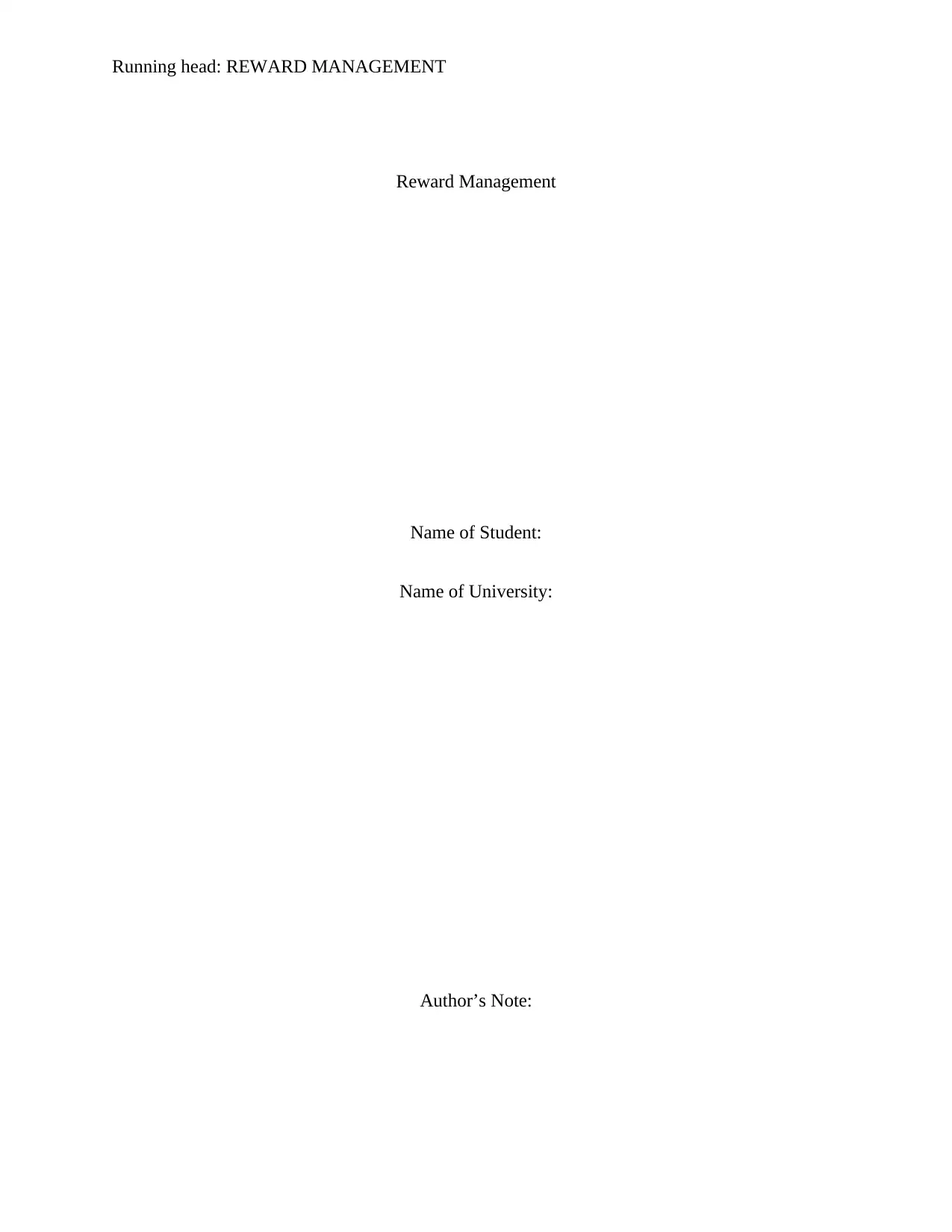
Running head: REWARD MANAGEMENT
Reward Management
Name of Student:
Name of University:
Author’s Note:
Reward Management
Name of Student:
Name of University:
Author’s Note:
Paraphrase This Document
Need a fresh take? Get an instant paraphrase of this document with our AI Paraphraser
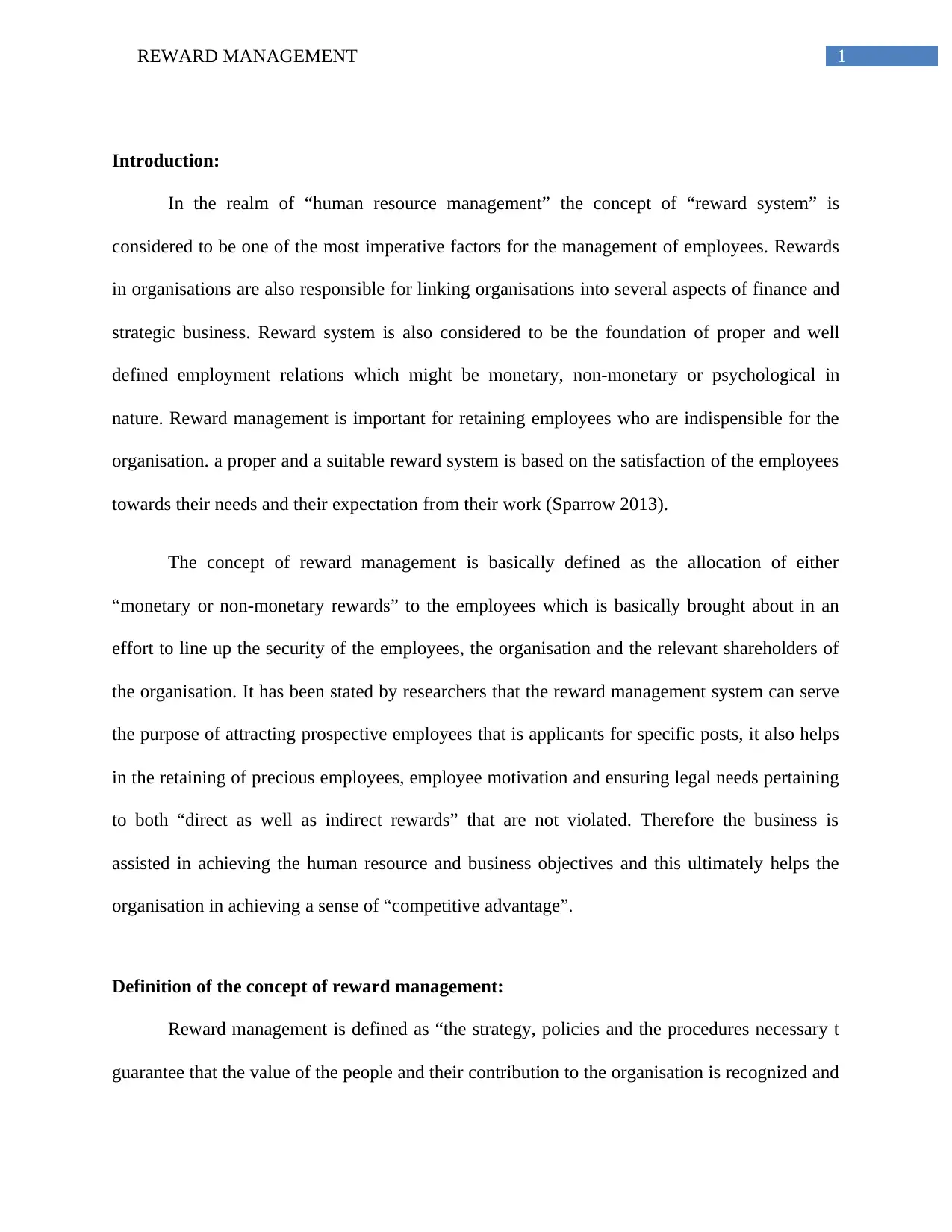
1REWARD MANAGEMENT
Introduction:
In the realm of “human resource management” the concept of “reward system” is
considered to be one of the most imperative factors for the management of employees. Rewards
in organisations are also responsible for linking organisations into several aspects of finance and
strategic business. Reward system is also considered to be the foundation of proper and well
defined employment relations which might be monetary, non-monetary or psychological in
nature. Reward management is important for retaining employees who are indispensible for the
organisation. a proper and a suitable reward system is based on the satisfaction of the employees
towards their needs and their expectation from their work (Sparrow 2013).
The concept of reward management is basically defined as the allocation of either
“monetary or non-monetary rewards” to the employees which is basically brought about in an
effort to line up the security of the employees, the organisation and the relevant shareholders of
the organisation. It has been stated by researchers that the reward management system can serve
the purpose of attracting prospective employees that is applicants for specific posts, it also helps
in the retaining of precious employees, employee motivation and ensuring legal needs pertaining
to both “direct as well as indirect rewards” that are not violated. Therefore the business is
assisted in achieving the human resource and business objectives and this ultimately helps the
organisation in achieving a sense of “competitive advantage”.
Definition of the concept of reward management:
Reward management is defined as “the strategy, policies and the procedures necessary t
guarantee that the value of the people and their contribution to the organisation is recognized and
Introduction:
In the realm of “human resource management” the concept of “reward system” is
considered to be one of the most imperative factors for the management of employees. Rewards
in organisations are also responsible for linking organisations into several aspects of finance and
strategic business. Reward system is also considered to be the foundation of proper and well
defined employment relations which might be monetary, non-monetary or psychological in
nature. Reward management is important for retaining employees who are indispensible for the
organisation. a proper and a suitable reward system is based on the satisfaction of the employees
towards their needs and their expectation from their work (Sparrow 2013).
The concept of reward management is basically defined as the allocation of either
“monetary or non-monetary rewards” to the employees which is basically brought about in an
effort to line up the security of the employees, the organisation and the relevant shareholders of
the organisation. It has been stated by researchers that the reward management system can serve
the purpose of attracting prospective employees that is applicants for specific posts, it also helps
in the retaining of precious employees, employee motivation and ensuring legal needs pertaining
to both “direct as well as indirect rewards” that are not violated. Therefore the business is
assisted in achieving the human resource and business objectives and this ultimately helps the
organisation in achieving a sense of “competitive advantage”.
Definition of the concept of reward management:
Reward management is defined as “the strategy, policies and the procedures necessary t
guarantee that the value of the people and their contribution to the organisation is recognized and
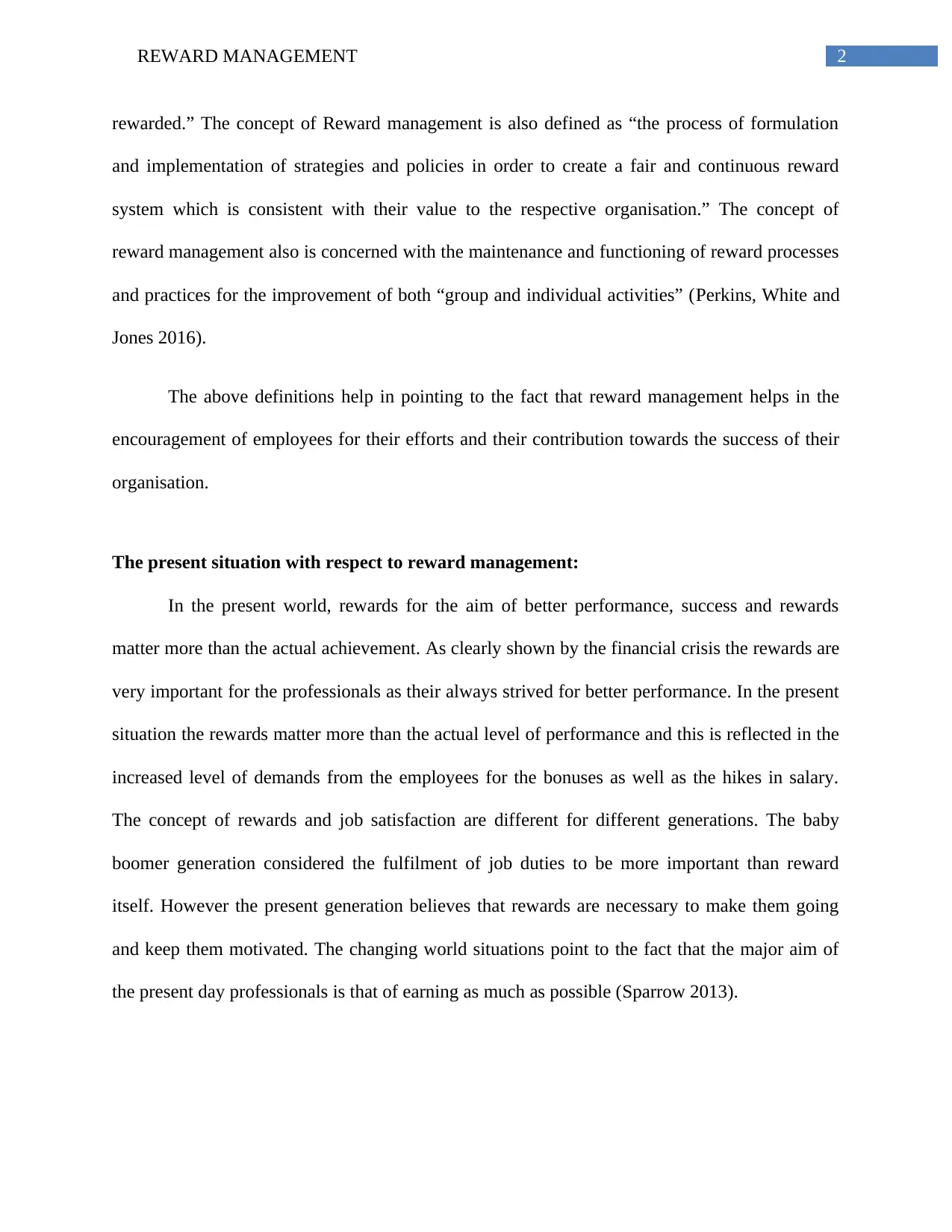
2REWARD MANAGEMENT
rewarded.” The concept of Reward management is also defined as “the process of formulation
and implementation of strategies and policies in order to create a fair and continuous reward
system which is consistent with their value to the respective organisation.” The concept of
reward management also is concerned with the maintenance and functioning of reward processes
and practices for the improvement of both “group and individual activities” (Perkins, White and
Jones 2016).
The above definitions help in pointing to the fact that reward management helps in the
encouragement of employees for their efforts and their contribution towards the success of their
organisation.
The present situation with respect to reward management:
In the present world, rewards for the aim of better performance, success and rewards
matter more than the actual achievement. As clearly shown by the financial crisis the rewards are
very important for the professionals as their always strived for better performance. In the present
situation the rewards matter more than the actual level of performance and this is reflected in the
increased level of demands from the employees for the bonuses as well as the hikes in salary.
The concept of rewards and job satisfaction are different for different generations. The baby
boomer generation considered the fulfilment of job duties to be more important than reward
itself. However the present generation believes that rewards are necessary to make them going
and keep them motivated. The changing world situations point to the fact that the major aim of
the present day professionals is that of earning as much as possible (Sparrow 2013).
rewarded.” The concept of Reward management is also defined as “the process of formulation
and implementation of strategies and policies in order to create a fair and continuous reward
system which is consistent with their value to the respective organisation.” The concept of
reward management also is concerned with the maintenance and functioning of reward processes
and practices for the improvement of both “group and individual activities” (Perkins, White and
Jones 2016).
The above definitions help in pointing to the fact that reward management helps in the
encouragement of employees for their efforts and their contribution towards the success of their
organisation.
The present situation with respect to reward management:
In the present world, rewards for the aim of better performance, success and rewards
matter more than the actual achievement. As clearly shown by the financial crisis the rewards are
very important for the professionals as their always strived for better performance. In the present
situation the rewards matter more than the actual level of performance and this is reflected in the
increased level of demands from the employees for the bonuses as well as the hikes in salary.
The concept of rewards and job satisfaction are different for different generations. The baby
boomer generation considered the fulfilment of job duties to be more important than reward
itself. However the present generation believes that rewards are necessary to make them going
and keep them motivated. The changing world situations point to the fact that the major aim of
the present day professionals is that of earning as much as possible (Sparrow 2013).
⊘ This is a preview!⊘
Do you want full access?
Subscribe today to unlock all pages.

Trusted by 1+ million students worldwide
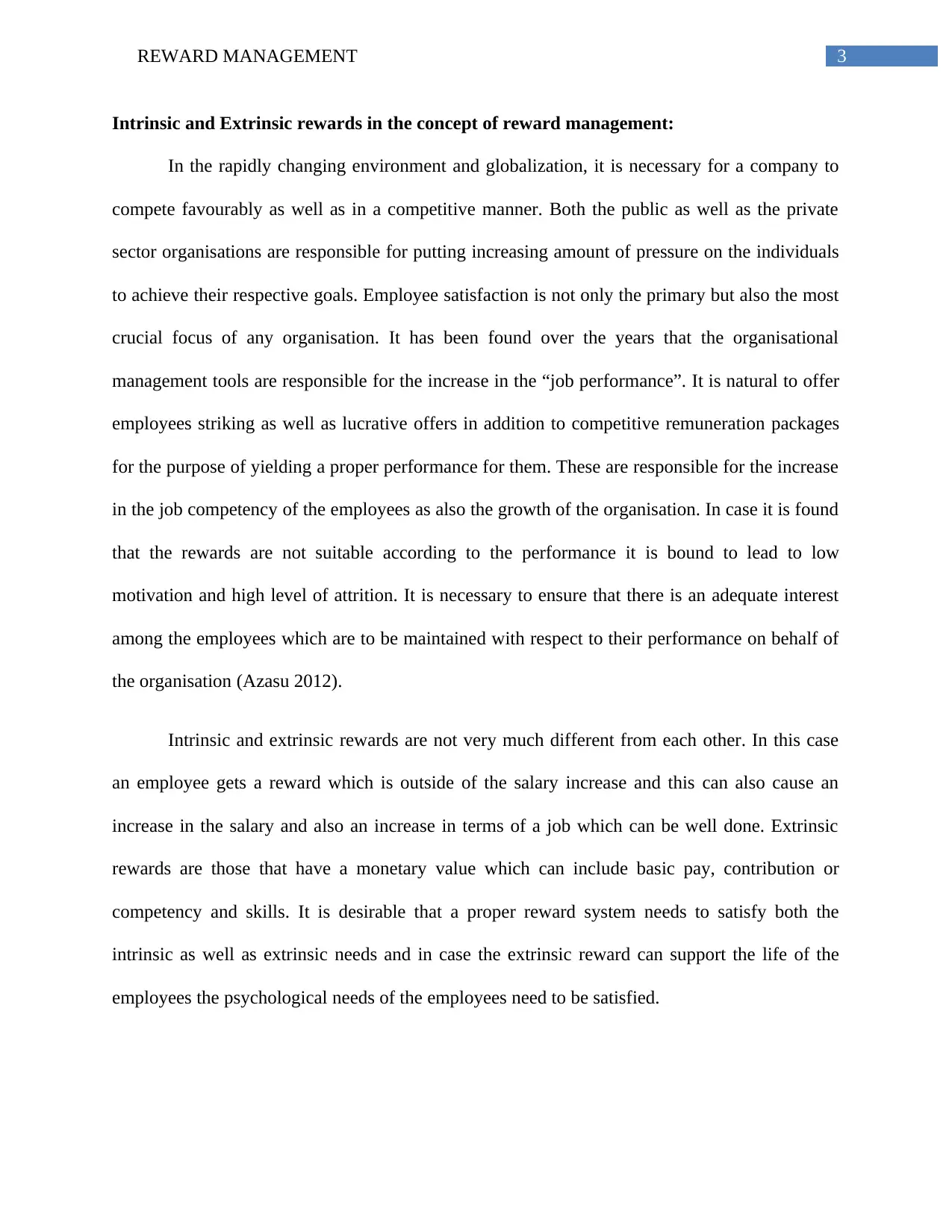
3REWARD MANAGEMENT
Intrinsic and Extrinsic rewards in the concept of reward management:
In the rapidly changing environment and globalization, it is necessary for a company to
compete favourably as well as in a competitive manner. Both the public as well as the private
sector organisations are responsible for putting increasing amount of pressure on the individuals
to achieve their respective goals. Employee satisfaction is not only the primary but also the most
crucial focus of any organisation. It has been found over the years that the organisational
management tools are responsible for the increase in the “job performance”. It is natural to offer
employees striking as well as lucrative offers in addition to competitive remuneration packages
for the purpose of yielding a proper performance for them. These are responsible for the increase
in the job competency of the employees as also the growth of the organisation. In case it is found
that the rewards are not suitable according to the performance it is bound to lead to low
motivation and high level of attrition. It is necessary to ensure that there is an adequate interest
among the employees which are to be maintained with respect to their performance on behalf of
the organisation (Azasu 2012).
Intrinsic and extrinsic rewards are not very much different from each other. In this case
an employee gets a reward which is outside of the salary increase and this can also cause an
increase in the salary and also an increase in terms of a job which can be well done. Extrinsic
rewards are those that have a monetary value which can include basic pay, contribution or
competency and skills. It is desirable that a proper reward system needs to satisfy both the
intrinsic as well as extrinsic needs and in case the extrinsic reward can support the life of the
employees the psychological needs of the employees need to be satisfied.
Intrinsic and Extrinsic rewards in the concept of reward management:
In the rapidly changing environment and globalization, it is necessary for a company to
compete favourably as well as in a competitive manner. Both the public as well as the private
sector organisations are responsible for putting increasing amount of pressure on the individuals
to achieve their respective goals. Employee satisfaction is not only the primary but also the most
crucial focus of any organisation. It has been found over the years that the organisational
management tools are responsible for the increase in the “job performance”. It is natural to offer
employees striking as well as lucrative offers in addition to competitive remuneration packages
for the purpose of yielding a proper performance for them. These are responsible for the increase
in the job competency of the employees as also the growth of the organisation. In case it is found
that the rewards are not suitable according to the performance it is bound to lead to low
motivation and high level of attrition. It is necessary to ensure that there is an adequate interest
among the employees which are to be maintained with respect to their performance on behalf of
the organisation (Azasu 2012).
Intrinsic and extrinsic rewards are not very much different from each other. In this case
an employee gets a reward which is outside of the salary increase and this can also cause an
increase in the salary and also an increase in terms of a job which can be well done. Extrinsic
rewards are those that have a monetary value which can include basic pay, contribution or
competency and skills. It is desirable that a proper reward system needs to satisfy both the
intrinsic as well as extrinsic needs and in case the extrinsic reward can support the life of the
employees the psychological needs of the employees need to be satisfied.
Paraphrase This Document
Need a fresh take? Get an instant paraphrase of this document with our AI Paraphraser
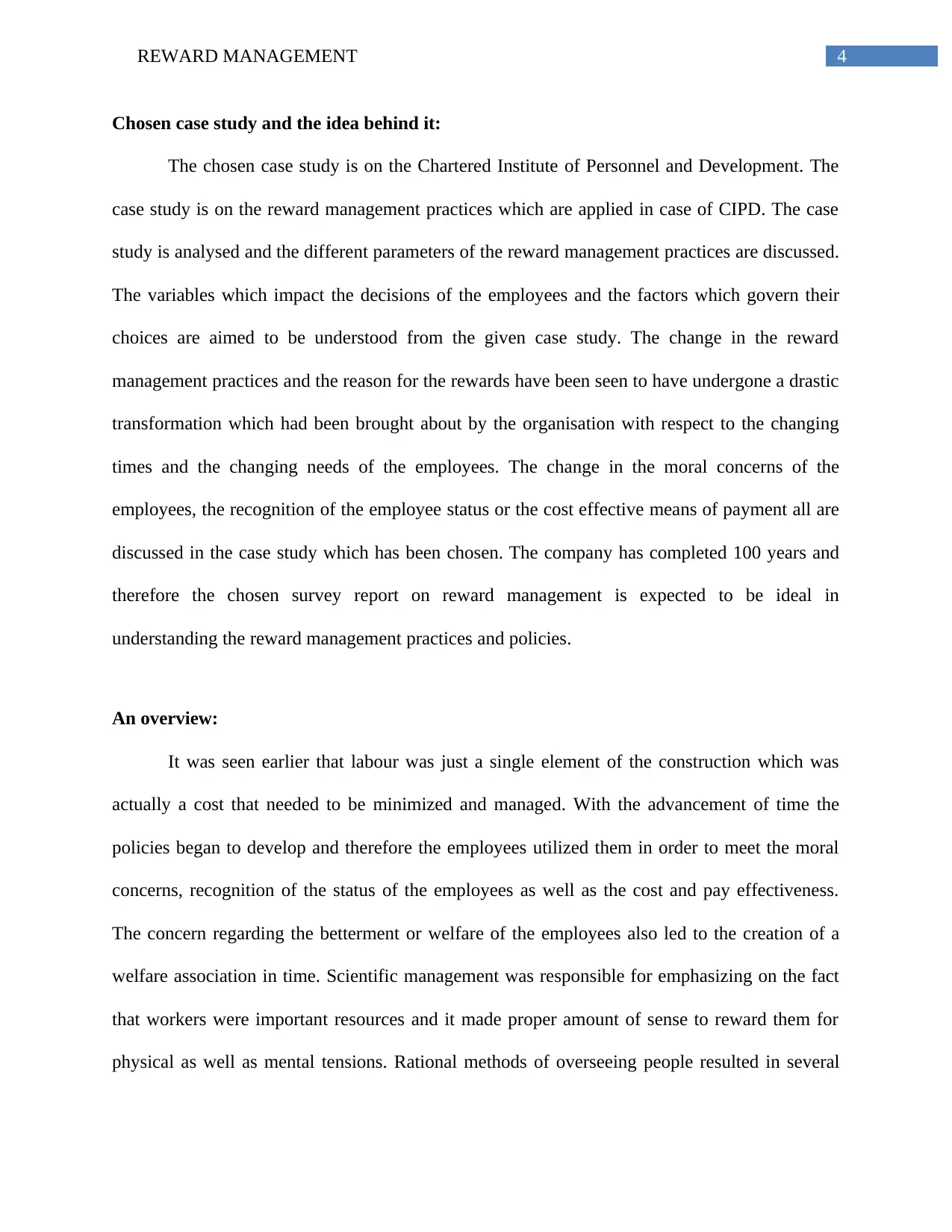
4REWARD MANAGEMENT
Chosen case study and the idea behind it:
The chosen case study is on the Chartered Institute of Personnel and Development. The
case study is on the reward management practices which are applied in case of CIPD. The case
study is analysed and the different parameters of the reward management practices are discussed.
The variables which impact the decisions of the employees and the factors which govern their
choices are aimed to be understood from the given case study. The change in the reward
management practices and the reason for the rewards have been seen to have undergone a drastic
transformation which had been brought about by the organisation with respect to the changing
times and the changing needs of the employees. The change in the moral concerns of the
employees, the recognition of the employee status or the cost effective means of payment all are
discussed in the case study which has been chosen. The company has completed 100 years and
therefore the chosen survey report on reward management is expected to be ideal in
understanding the reward management practices and policies.
An overview:
It was seen earlier that labour was just a single element of the construction which was
actually a cost that needed to be minimized and managed. With the advancement of time the
policies began to develop and therefore the employees utilized them in order to meet the moral
concerns, recognition of the status of the employees as well as the cost and pay effectiveness.
The concern regarding the betterment or welfare of the employees also led to the creation of a
welfare association in time. Scientific management was responsible for emphasizing on the fact
that workers were important resources and it made proper amount of sense to reward them for
physical as well as mental tensions. Rational methods of overseeing people resulted in several
Chosen case study and the idea behind it:
The chosen case study is on the Chartered Institute of Personnel and Development. The
case study is on the reward management practices which are applied in case of CIPD. The case
study is analysed and the different parameters of the reward management practices are discussed.
The variables which impact the decisions of the employees and the factors which govern their
choices are aimed to be understood from the given case study. The change in the reward
management practices and the reason for the rewards have been seen to have undergone a drastic
transformation which had been brought about by the organisation with respect to the changing
times and the changing needs of the employees. The change in the moral concerns of the
employees, the recognition of the employee status or the cost effective means of payment all are
discussed in the case study which has been chosen. The company has completed 100 years and
therefore the chosen survey report on reward management is expected to be ideal in
understanding the reward management practices and policies.
An overview:
It was seen earlier that labour was just a single element of the construction which was
actually a cost that needed to be minimized and managed. With the advancement of time the
policies began to develop and therefore the employees utilized them in order to meet the moral
concerns, recognition of the status of the employees as well as the cost and pay effectiveness.
The concern regarding the betterment or welfare of the employees also led to the creation of a
welfare association in time. Scientific management was responsible for emphasizing on the fact
that workers were important resources and it made proper amount of sense to reward them for
physical as well as mental tensions. Rational methods of overseeing people resulted in several
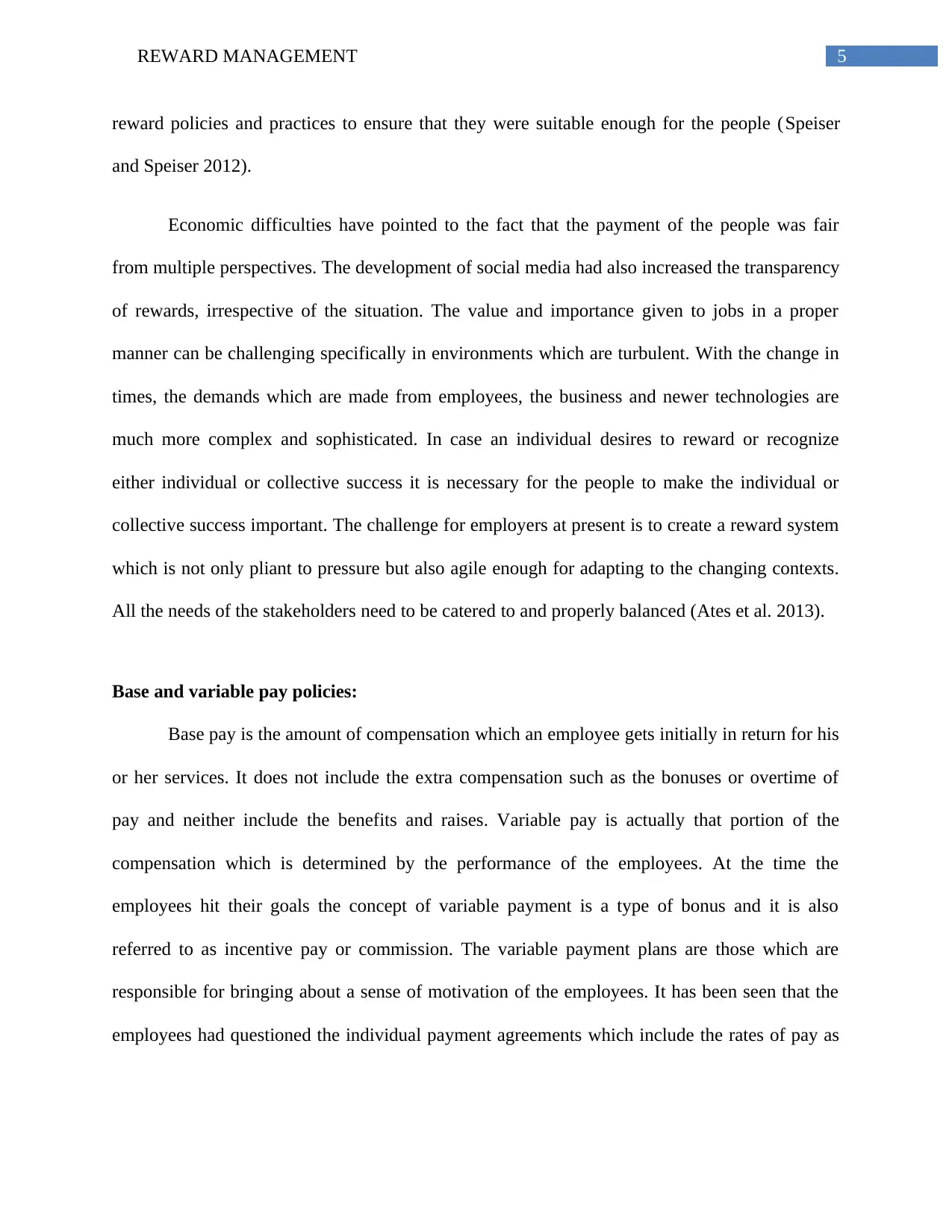
5REWARD MANAGEMENT
reward policies and practices to ensure that they were suitable enough for the people (Speiser
and Speiser 2012).
Economic difficulties have pointed to the fact that the payment of the people was fair
from multiple perspectives. The development of social media had also increased the transparency
of rewards, irrespective of the situation. The value and importance given to jobs in a proper
manner can be challenging specifically in environments which are turbulent. With the change in
times, the demands which are made from employees, the business and newer technologies are
much more complex and sophisticated. In case an individual desires to reward or recognize
either individual or collective success it is necessary for the people to make the individual or
collective success important. The challenge for employers at present is to create a reward system
which is not only pliant to pressure but also agile enough for adapting to the changing contexts.
All the needs of the stakeholders need to be catered to and properly balanced (Ates et al. 2013).
Base and variable pay policies:
Base pay is the amount of compensation which an employee gets initially in return for his
or her services. It does not include the extra compensation such as the bonuses or overtime of
pay and neither include the benefits and raises. Variable pay is actually that portion of the
compensation which is determined by the performance of the employees. At the time the
employees hit their goals the concept of variable payment is a type of bonus and it is also
referred to as incentive pay or commission. The variable payment plans are those which are
responsible for bringing about a sense of motivation of the employees. It has been seen that the
employees had questioned the individual payment agreements which include the rates of pay as
reward policies and practices to ensure that they were suitable enough for the people (Speiser
and Speiser 2012).
Economic difficulties have pointed to the fact that the payment of the people was fair
from multiple perspectives. The development of social media had also increased the transparency
of rewards, irrespective of the situation. The value and importance given to jobs in a proper
manner can be challenging specifically in environments which are turbulent. With the change in
times, the demands which are made from employees, the business and newer technologies are
much more complex and sophisticated. In case an individual desires to reward or recognize
either individual or collective success it is necessary for the people to make the individual or
collective success important. The challenge for employers at present is to create a reward system
which is not only pliant to pressure but also agile enough for adapting to the changing contexts.
All the needs of the stakeholders need to be catered to and properly balanced (Ates et al. 2013).
Base and variable pay policies:
Base pay is the amount of compensation which an employee gets initially in return for his
or her services. It does not include the extra compensation such as the bonuses or overtime of
pay and neither include the benefits and raises. Variable pay is actually that portion of the
compensation which is determined by the performance of the employees. At the time the
employees hit their goals the concept of variable payment is a type of bonus and it is also
referred to as incentive pay or commission. The variable payment plans are those which are
responsible for bringing about a sense of motivation of the employees. It has been seen that the
employees had questioned the individual payment agreements which include the rates of pay as
⊘ This is a preview!⊘
Do you want full access?
Subscribe today to unlock all pages.

Trusted by 1+ million students worldwide
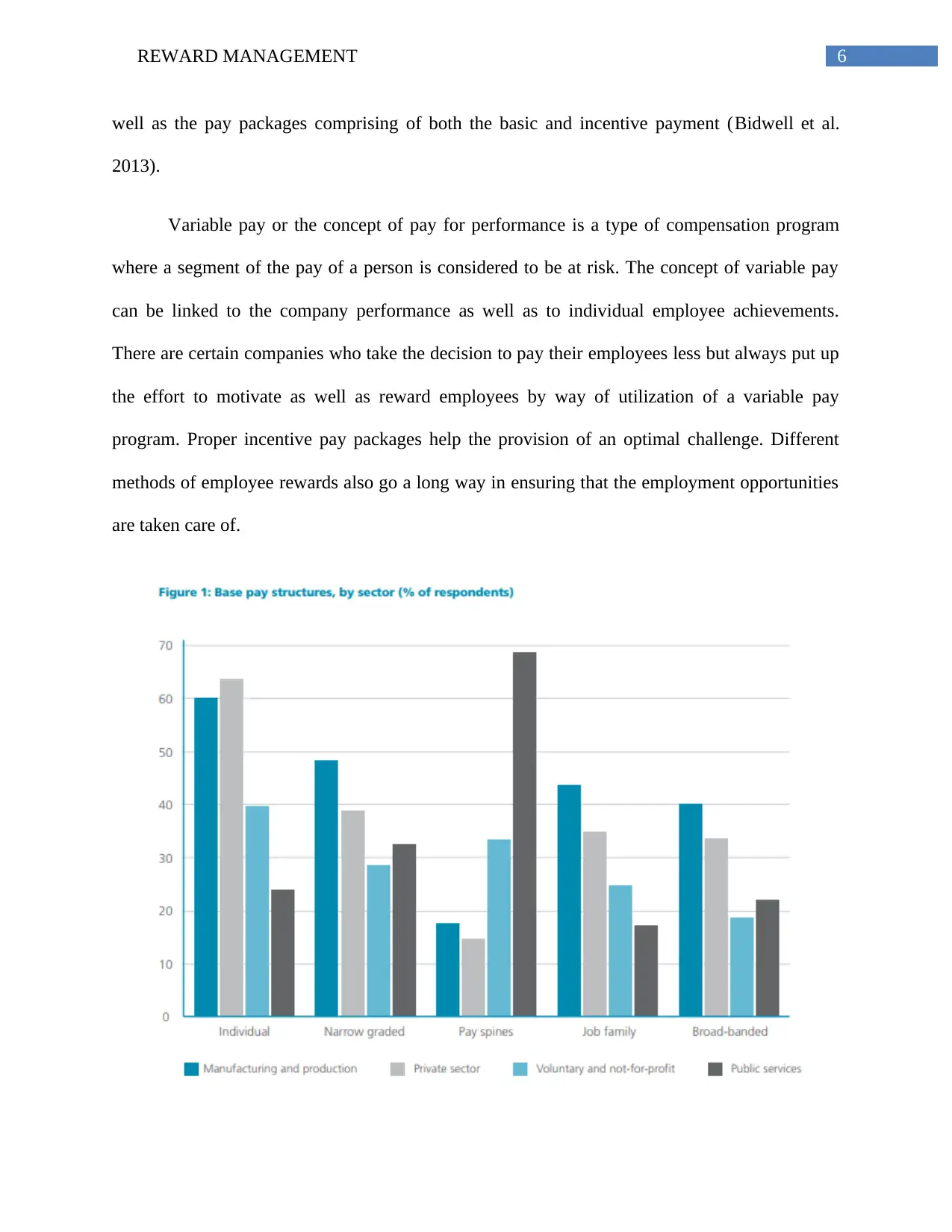
6REWARD MANAGEMENT
well as the pay packages comprising of both the basic and incentive payment (Bidwell et al.
2013).
Variable pay or the concept of pay for performance is a type of compensation program
where a segment of the pay of a person is considered to be at risk. The concept of variable pay
can be linked to the company performance as well as to individual employee achievements.
There are certain companies who take the decision to pay their employees less but always put up
the effort to motivate as well as reward employees by way of utilization of a variable pay
program. Proper incentive pay packages help the provision of an optimal challenge. Different
methods of employee rewards also go a long way in ensuring that the employment opportunities
are taken care of.
well as the pay packages comprising of both the basic and incentive payment (Bidwell et al.
2013).
Variable pay or the concept of pay for performance is a type of compensation program
where a segment of the pay of a person is considered to be at risk. The concept of variable pay
can be linked to the company performance as well as to individual employee achievements.
There are certain companies who take the decision to pay their employees less but always put up
the effort to motivate as well as reward employees by way of utilization of a variable pay
program. Proper incentive pay packages help the provision of an optimal challenge. Different
methods of employee rewards also go a long way in ensuring that the employment opportunities
are taken care of.
Paraphrase This Document
Need a fresh take? Get an instant paraphrase of this document with our AI Paraphraser
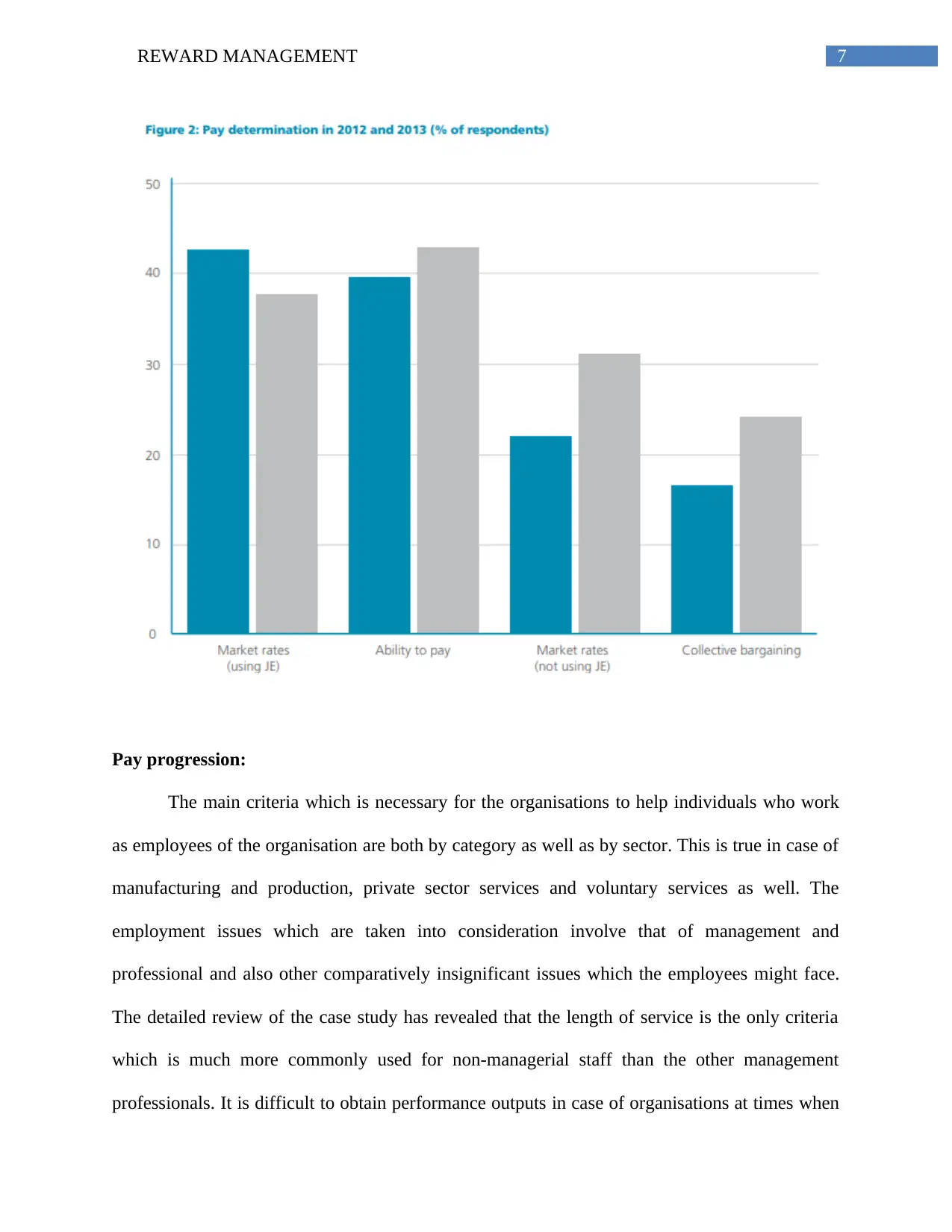
7REWARD MANAGEMENT
Pay progression:
The main criteria which is necessary for the organisations to help individuals who work
as employees of the organisation are both by category as well as by sector. This is true in case of
manufacturing and production, private sector services and voluntary services as well. The
employment issues which are taken into consideration involve that of management and
professional and also other comparatively insignificant issues which the employees might face.
The detailed review of the case study has revealed that the length of service is the only criteria
which is much more commonly used for non-managerial staff than the other management
professionals. It is difficult to obtain performance outputs in case of organisations at times when
Pay progression:
The main criteria which is necessary for the organisations to help individuals who work
as employees of the organisation are both by category as well as by sector. This is true in case of
manufacturing and production, private sector services and voluntary services as well. The
employment issues which are taken into consideration involve that of management and
professional and also other comparatively insignificant issues which the employees might face.
The detailed review of the case study has revealed that the length of service is the only criteria
which is much more commonly used for non-managerial staff than the other management
professionals. It is difficult to obtain performance outputs in case of organisations at times when
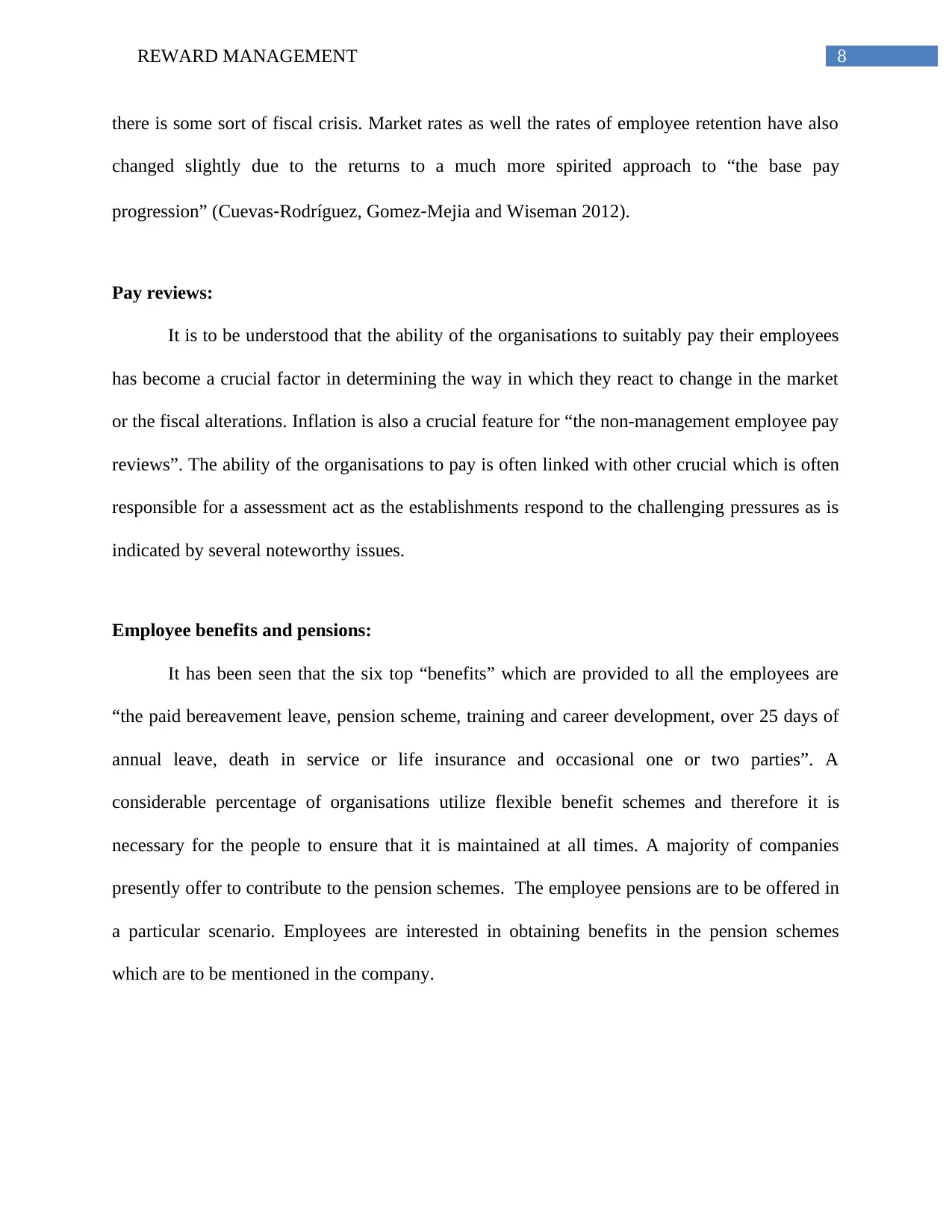
8REWARD MANAGEMENT
there is some sort of fiscal crisis. Market rates as well the rates of employee retention have also
changed slightly due to the returns to a much more spirited approach to “the base pay
progression” (Cuevas‐Rodríguez, Gomez‐Mejia and Wiseman 2012).
Pay reviews:
It is to be understood that the ability of the organisations to suitably pay their employees
has become a crucial factor in determining the way in which they react to change in the market
or the fiscal alterations. Inflation is also a crucial feature for “the non-management employee pay
reviews”. The ability of the organisations to pay is often linked with other crucial which is often
responsible for a assessment act as the establishments respond to the challenging pressures as is
indicated by several noteworthy issues.
Employee benefits and pensions:
It has been seen that the six top “benefits” which are provided to all the employees are
“the paid bereavement leave, pension scheme, training and career development, over 25 days of
annual leave, death in service or life insurance and occasional one or two parties”. A
considerable percentage of organisations utilize flexible benefit schemes and therefore it is
necessary for the people to ensure that it is maintained at all times. A majority of companies
presently offer to contribute to the pension schemes. The employee pensions are to be offered in
a particular scenario. Employees are interested in obtaining benefits in the pension schemes
which are to be mentioned in the company.
there is some sort of fiscal crisis. Market rates as well the rates of employee retention have also
changed slightly due to the returns to a much more spirited approach to “the base pay
progression” (Cuevas‐Rodríguez, Gomez‐Mejia and Wiseman 2012).
Pay reviews:
It is to be understood that the ability of the organisations to suitably pay their employees
has become a crucial factor in determining the way in which they react to change in the market
or the fiscal alterations. Inflation is also a crucial feature for “the non-management employee pay
reviews”. The ability of the organisations to pay is often linked with other crucial which is often
responsible for a assessment act as the establishments respond to the challenging pressures as is
indicated by several noteworthy issues.
Employee benefits and pensions:
It has been seen that the six top “benefits” which are provided to all the employees are
“the paid bereavement leave, pension scheme, training and career development, over 25 days of
annual leave, death in service or life insurance and occasional one or two parties”. A
considerable percentage of organisations utilize flexible benefit schemes and therefore it is
necessary for the people to ensure that it is maintained at all times. A majority of companies
presently offer to contribute to the pension schemes. The employee pensions are to be offered in
a particular scenario. Employees are interested in obtaining benefits in the pension schemes
which are to be mentioned in the company.
⊘ This is a preview!⊘
Do you want full access?
Subscribe today to unlock all pages.

Trusted by 1+ million students worldwide
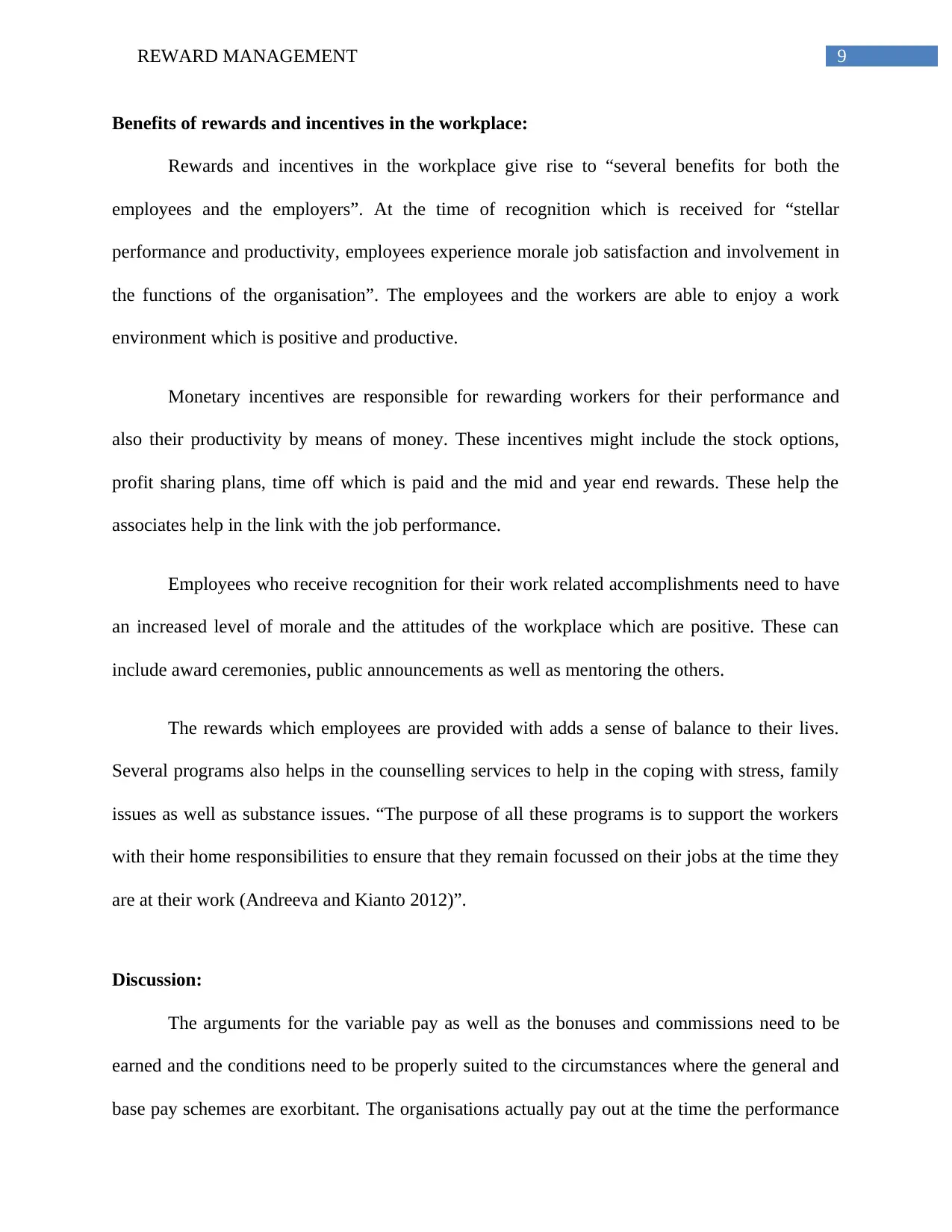
9REWARD MANAGEMENT
Benefits of rewards and incentives in the workplace:
Rewards and incentives in the workplace give rise to “several benefits for both the
employees and the employers”. At the time of recognition which is received for “stellar
performance and productivity, employees experience morale job satisfaction and involvement in
the functions of the organisation”. The employees and the workers are able to enjoy a work
environment which is positive and productive.
Monetary incentives are responsible for rewarding workers for their performance and
also their productivity by means of money. These incentives might include the stock options,
profit sharing plans, time off which is paid and the mid and year end rewards. These help the
associates help in the link with the job performance.
Employees who receive recognition for their work related accomplishments need to have
an increased level of morale and the attitudes of the workplace which are positive. These can
include award ceremonies, public announcements as well as mentoring the others.
The rewards which employees are provided with adds a sense of balance to their lives.
Several programs also helps in the counselling services to help in the coping with stress, family
issues as well as substance issues. “The purpose of all these programs is to support the workers
with their home responsibilities to ensure that they remain focussed on their jobs at the time they
are at their work (Andreeva and Kianto 2012)”.
Discussion:
The arguments for the variable pay as well as the bonuses and commissions need to be
earned and the conditions need to be properly suited to the circumstances where the general and
base pay schemes are exorbitant. The organisations actually pay out at the time the performance
Benefits of rewards and incentives in the workplace:
Rewards and incentives in the workplace give rise to “several benefits for both the
employees and the employers”. At the time of recognition which is received for “stellar
performance and productivity, employees experience morale job satisfaction and involvement in
the functions of the organisation”. The employees and the workers are able to enjoy a work
environment which is positive and productive.
Monetary incentives are responsible for rewarding workers for their performance and
also their productivity by means of money. These incentives might include the stock options,
profit sharing plans, time off which is paid and the mid and year end rewards. These help the
associates help in the link with the job performance.
Employees who receive recognition for their work related accomplishments need to have
an increased level of morale and the attitudes of the workplace which are positive. These can
include award ceremonies, public announcements as well as mentoring the others.
The rewards which employees are provided with adds a sense of balance to their lives.
Several programs also helps in the counselling services to help in the coping with stress, family
issues as well as substance issues. “The purpose of all these programs is to support the workers
with their home responsibilities to ensure that they remain focussed on their jobs at the time they
are at their work (Andreeva and Kianto 2012)”.
Discussion:
The arguments for the variable pay as well as the bonuses and commissions need to be
earned and the conditions need to be properly suited to the circumstances where the general and
base pay schemes are exorbitant. The organisations actually pay out at the time the performance
Paraphrase This Document
Need a fresh take? Get an instant paraphrase of this document with our AI Paraphraser
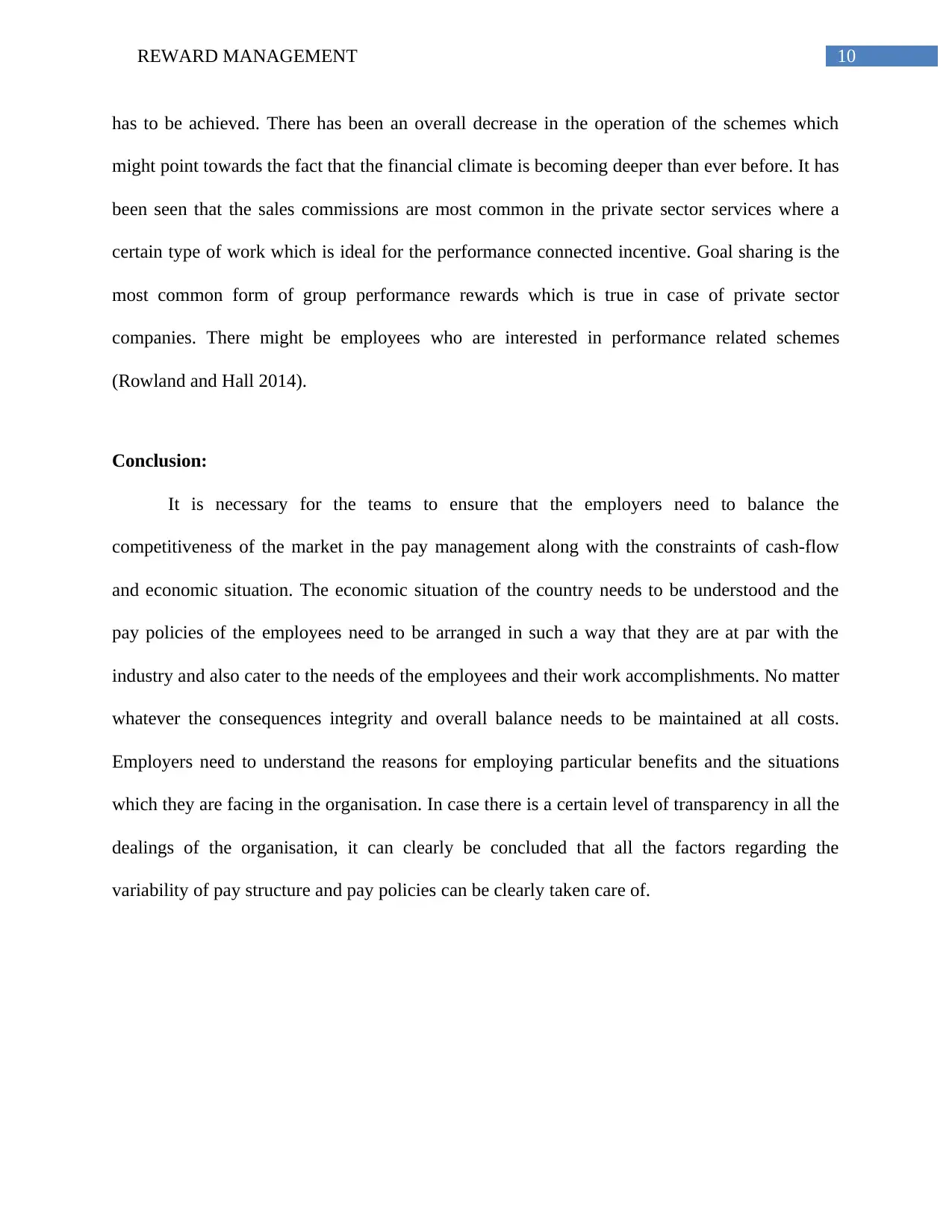
10REWARD MANAGEMENT
has to be achieved. There has been an overall decrease in the operation of the schemes which
might point towards the fact that the financial climate is becoming deeper than ever before. It has
been seen that the sales commissions are most common in the private sector services where a
certain type of work which is ideal for the performance connected incentive. Goal sharing is the
most common form of group performance rewards which is true in case of private sector
companies. There might be employees who are interested in performance related schemes
(Rowland and Hall 2014).
Conclusion:
It is necessary for the teams to ensure that the employers need to balance the
competitiveness of the market in the pay management along with the constraints of cash-flow
and economic situation. The economic situation of the country needs to be understood and the
pay policies of the employees need to be arranged in such a way that they are at par with the
industry and also cater to the needs of the employees and their work accomplishments. No matter
whatever the consequences integrity and overall balance needs to be maintained at all costs.
Employers need to understand the reasons for employing particular benefits and the situations
which they are facing in the organisation. In case there is a certain level of transparency in all the
dealings of the organisation, it can clearly be concluded that all the factors regarding the
variability of pay structure and pay policies can be clearly taken care of.
has to be achieved. There has been an overall decrease in the operation of the schemes which
might point towards the fact that the financial climate is becoming deeper than ever before. It has
been seen that the sales commissions are most common in the private sector services where a
certain type of work which is ideal for the performance connected incentive. Goal sharing is the
most common form of group performance rewards which is true in case of private sector
companies. There might be employees who are interested in performance related schemes
(Rowland and Hall 2014).
Conclusion:
It is necessary for the teams to ensure that the employers need to balance the
competitiveness of the market in the pay management along with the constraints of cash-flow
and economic situation. The economic situation of the country needs to be understood and the
pay policies of the employees need to be arranged in such a way that they are at par with the
industry and also cater to the needs of the employees and their work accomplishments. No matter
whatever the consequences integrity and overall balance needs to be maintained at all costs.
Employers need to understand the reasons for employing particular benefits and the situations
which they are facing in the organisation. In case there is a certain level of transparency in all the
dealings of the organisation, it can clearly be concluded that all the factors regarding the
variability of pay structure and pay policies can be clearly taken care of.
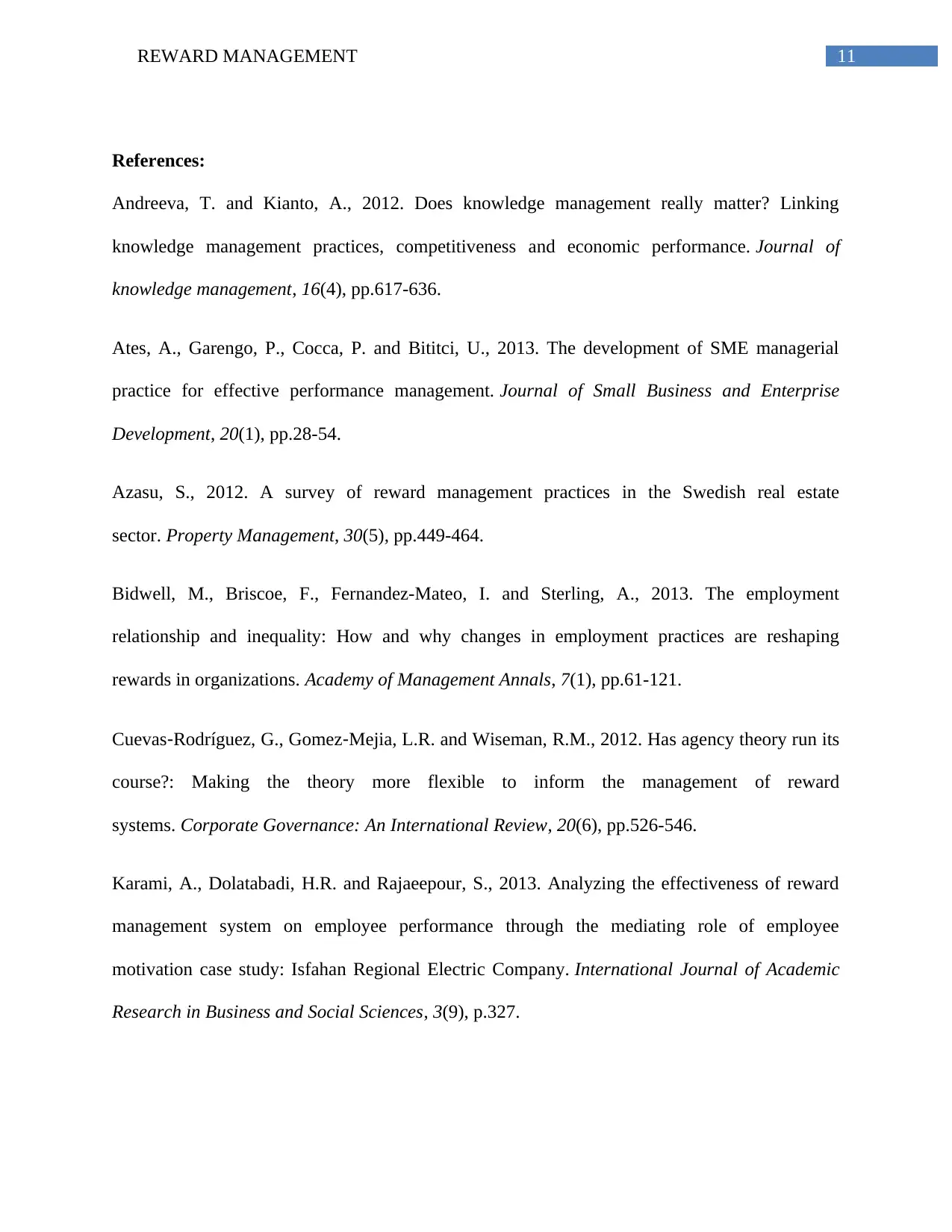
11REWARD MANAGEMENT
References:
Andreeva, T. and Kianto, A., 2012. Does knowledge management really matter? Linking
knowledge management practices, competitiveness and economic performance. Journal of
knowledge management, 16(4), pp.617-636.
Ates, A., Garengo, P., Cocca, P. and Bititci, U., 2013. The development of SME managerial
practice for effective performance management. Journal of Small Business and Enterprise
Development, 20(1), pp.28-54.
Azasu, S., 2012. A survey of reward management practices in the Swedish real estate
sector. Property Management, 30(5), pp.449-464.
Bidwell, M., Briscoe, F., Fernandez-Mateo, I. and Sterling, A., 2013. The employment
relationship and inequality: How and why changes in employment practices are reshaping
rewards in organizations. Academy of Management Annals, 7(1), pp.61-121.
Cuevas‐Rodríguez, G., Gomez‐Mejia, L.R. and Wiseman, R.M., 2012. Has agency theory run its
course?: Making the theory more flexible to inform the management of reward
systems. Corporate Governance: An International Review, 20(6), pp.526-546.
Karami, A., Dolatabadi, H.R. and Rajaeepour, S., 2013. Analyzing the effectiveness of reward
management system on employee performance through the mediating role of employee
motivation case study: Isfahan Regional Electric Company. International Journal of Academic
Research in Business and Social Sciences, 3(9), p.327.
References:
Andreeva, T. and Kianto, A., 2012. Does knowledge management really matter? Linking
knowledge management practices, competitiveness and economic performance. Journal of
knowledge management, 16(4), pp.617-636.
Ates, A., Garengo, P., Cocca, P. and Bititci, U., 2013. The development of SME managerial
practice for effective performance management. Journal of Small Business and Enterprise
Development, 20(1), pp.28-54.
Azasu, S., 2012. A survey of reward management practices in the Swedish real estate
sector. Property Management, 30(5), pp.449-464.
Bidwell, M., Briscoe, F., Fernandez-Mateo, I. and Sterling, A., 2013. The employment
relationship and inequality: How and why changes in employment practices are reshaping
rewards in organizations. Academy of Management Annals, 7(1), pp.61-121.
Cuevas‐Rodríguez, G., Gomez‐Mejia, L.R. and Wiseman, R.M., 2012. Has agency theory run its
course?: Making the theory more flexible to inform the management of reward
systems. Corporate Governance: An International Review, 20(6), pp.526-546.
Karami, A., Dolatabadi, H.R. and Rajaeepour, S., 2013. Analyzing the effectiveness of reward
management system on employee performance through the mediating role of employee
motivation case study: Isfahan Regional Electric Company. International Journal of Academic
Research in Business and Social Sciences, 3(9), p.327.
⊘ This is a preview!⊘
Do you want full access?
Subscribe today to unlock all pages.

Trusted by 1+ million students worldwide
1 out of 13
Related Documents
Your All-in-One AI-Powered Toolkit for Academic Success.
+13062052269
info@desklib.com
Available 24*7 on WhatsApp / Email
![[object Object]](/_next/static/media/star-bottom.7253800d.svg)
Unlock your academic potential
Copyright © 2020–2025 A2Z Services. All Rights Reserved. Developed and managed by ZUCOL.





